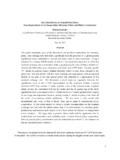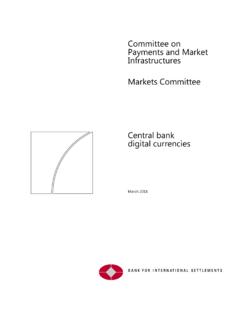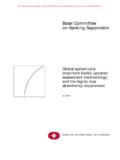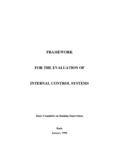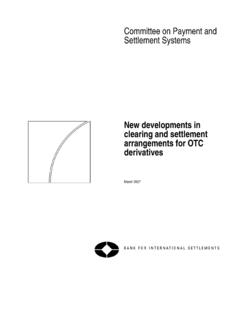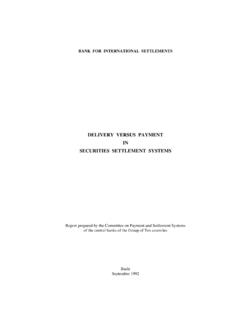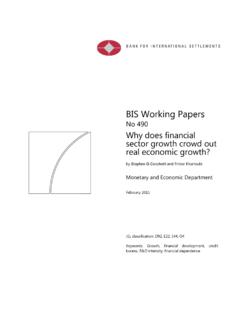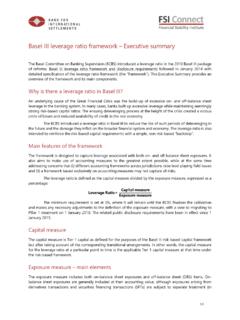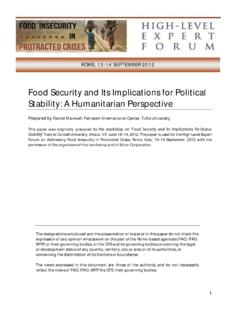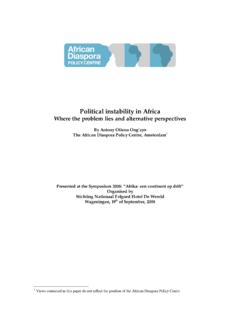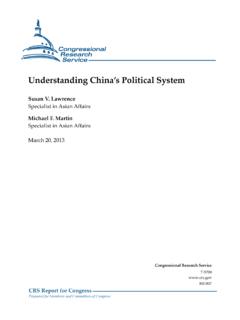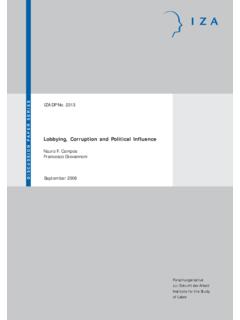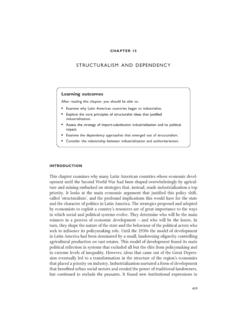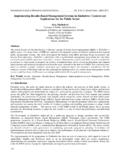Transcription of Mark Carney: Breaking the tragedy of the horizon - climate ...
1 BIS central bankers speeches 1 Mark Carney: Breaking the tragedy of the horizon climate change and financial stability Speech by Mr Mark Carney, Governor of the Bank of England and Chairman of the financial stability Board, at Lloyd s of London, London, 29 September 2015. * * * I am grateful to Rhys Phillips and Iain de Weymarn for their assistance in preparing these remarks, and to Michael Sheren, Clare Ashton, Matthew Scott and Professor Myles Allen for their comments. I m grateful to Lloyd s for the invitation to speak tonight on the occasion of the first City Dinner held in this magnificent, eponymous Room.
2 Lloyd s is the bedrock of the UK insurance industry. An industry whose direct contribution to the UK economy is impressive: 300,000 high-paying jobs and 25bn in annual GDP. Its economic contribution goes much deeper. Insurance supports households, companies and investors, safeguarding them from perils they could not otherwise shoulder. It matches long-term savings and investment, financing the infrastructure essential to productivity. With its unique perspective and skill set, insurance diversifies the financial system and reinforces its resilience.
3 Since 1688 Lloyd s has, in the great tradition of the City, served both the UK and the world, providing protection against the perils of the age; helping enterprise and trade to thrive. From its origins in marine insurance, the Lloyd s market has evolved constantly to meet the needs of a rapidly changing world. The first excess of loss reinsurance was created here. Modern catastrophe cover was born with your decision to stand by policyholders after the San Francisco earthquake. And Lloyd s pioneered aviation With eyes constantly on the horizon , Lloyd s has remained at the forefront of global insurance.
4 Today, you are insuring new classes of risk in new parts of the world from cyber to climate , from space to specie, from Curitiba to Chengdu. And you are doing so in market conditions as challenging as any in the last 20 years. The need to manage emerging, mega risks is as important as ever. Alongside major technological, demographic and political shifts, our very world is changing. Shifts in our climate bring potentially profound implications for insurers, financial stability and the economy. I will focus on those risks from climate change this evening. 1 The first aviation policy was written in 1911, followed in 1919 by the founding of the British Aviation Insurance Association.
5 That venture closed in 1921, with underwriters concluding that there seems to be no immediate future in aviation 2 BIS central bankers speeches The tragedy of the horizon There is a growing international consensus that climate change is Many of the changes in our world since the 1950s are without precedent: not merely over decades but over millennia. Research tells us with a high degree of confidence that: In the Northern Hemisphere the last 30 years have been the warmest since Anglo-Saxon times; indeed, eight of the ten warmest years on record in the UK have occurred since 2002;3 Atmospheric concentrations of greenhouse gases are at levels not seen in 800,000 years; and The rate of sea level rise is quicker now than at any time over the last 2 Evidence is mounting of man s role in climate change .
6 Human drivers are judged extremely likely to have been the dominant cause of global warming since the mid-20th While natural fluctuations may mask it temporarily, the underlying human-induced warming trend of two-tenths of a degree per decade has continued unabated since the While there is always room for scientific disagreement about climate change (as there is with any scientific issue) I have found that insurers are amongst the most determined advocates for tackling it sooner rather than later. And little wonder. While others have been debating the theory, you have been dealing with the reality: Since the 1980s the number of registered weather-related loss events has tripled; and Inflation-adjusted insurance losses from these events have increased from an annual average of around $10bn in the 1980s to around $50bn over the past The challenges currently posed by climate change pale in significance compared with what might come.
7 The far-sighted amongst you are anticipating broader global impacts on property, migration and political stability , as well as food and water So why isn t more being done to address it? A classic problem in environmental economics is the tragedy of the commons. The solution to it lies in property rights and supply management. 2 For instance, the IPCC has stated Warming of the climate system is unequivocal, and since the 1950s, many of the observed changes are unprecedented over decades to millennia . See IPCC - climate change 2014: Synthesis Report.
8 Contribution of Working Groups I, II and III to the Fifth Assessment Report of the Intergovernmental Panel on climate change (2014). 3 See 4 See IPCC (2014). 5 See IPCC (2014) which notes that the effects of anthropogenic greenhouse gas emissions, together with other anthropogenic drivers are extremely likely to have been the dominant cause of observed [global] warming since the mid-20th Century . 6 See, for example, Otto et al (2015). 7 See Munich Re, NatCatSERVICE (2015). 8 The report Risky Business the economic risks of climate change in the United States (2014) suggests that in the USA $238-507bn worth of coastal property could be below sea level by 2100.
9 Research by Lloyd s identifies climate change as an important supply-side issue for food security. See ~/media/lloyds/reports/emerging%20risk%2 0reports/food% This is consistent with the views expressed by Lloyd s market participants surveyed by the PRA for its report to Defra. BIS central bankers speeches 3 climate change is the tragedy of the horizon . We don t need an army of actuaries to tell us that the catastrophic impacts of climate change will be felt beyond the traditional horizons of most actors imposing a cost on future generations that the current generation has no direct incentive to fix.
10 That means beyond: the business cycle;9 the political cycle; and the horizon of technocratic authorities, like central banks, who are bound by their mandates. The horizon for monetary policy extends out to 2-3 years. For financial stability it is a bit longer, but typically only to the outer boundaries of the credit cycle about a In other words, once climate change becomes a defining issue for financial stability , it may already be too late. This paradox is deeper, as Lord Stern and others have amply demonstrated. As risks are a function of cumulative emissions, earlier action will mean less costly The desirability of restricting climate change to 2 degrees above pre-industrial levels12 leads to the notion of a carbon budget , an assessment of the amount of emissions the world can afford.
